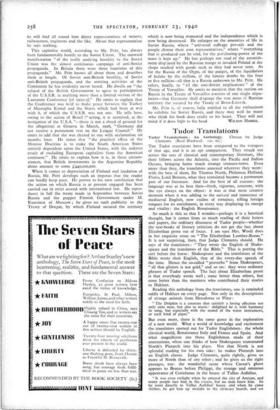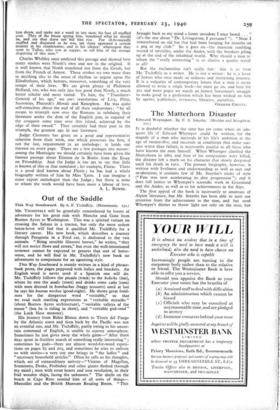Tudor_ Translations
Tudor Translations : An Anthology. Chosen by Judge Clements. (B3sil Blackwell. 12s. 6d.) THE Tudor translators have been compared to the voyagers of that age, and it is an apt comparison. They struck out across the seas of classical and • contemporary literature, like
their fellows across the Atlantic, into the Pacific and Indian Oceans, bringing home much strange treasure-trove. Even more than they, the translators annexed wherever they went : with the best of them, Sir Thomas North, Philemon Holland, Florio, Lord Bemers, what they translated became a permanent part of our literature. And for the best of all reasons : the language was at its best then—fresh, vigorous, concrete, with the eye always on the object : it was at that most creative moment when it was adding to the naiveté and innocence of mediaeval English, new realms of romance, rifling foreign tongues for its enrichment, in every way displaying its energy and vitality : the English Renaissance.
So much is this so that I wonder—perhaps it is a heretical thought, but it comes from so much reading of their letters and papers, the ordinary discourse of Tudor people—whether the text-books of literary criticism do not get the fact about Elizabethan prose out of focus. I am sure Mrs. Woolf does in her exquisite essay on " The Elizabethan Lumber-Room." It is not surprising, then, that Judge Clements should. He says of the translators : " They wrote the English of Shake- speare and the translators of the Bible." This is putting the cart before the horse : Shakespeare and the translators of the Bible wrote their English, that of the every-day speech of the time. Hence the so-called " proverbs " from Shakespeare, " all that glisters is not gold," and so on : they were ordinary phrases of Tudor speech. The fact about Elizabethan prose is that everybody wrote well ; some better than others, but none better than the mariners who contributed their stories to Hakluyt.
Reading this anthology from the translators, one is reminded oddly of Hakluyt on every page. Not only in the descriptions of strange animals from Herodotus or Pliny : " The Dolphin is a creature that carrieth a loving affection not only unto man, but also to music: delighted he is with harmony in song, but especially with the sound of the water instrument, or such kind of pipes."
But even more, there is the same gusto in the exploration of a new world. What a world of knowledge and excitement the translators opened out for Tudor Englishmen: the whole classical world, Renaissance Italy and France and Spain. And what magnificent use those Englishmen made of their annexations, when one thinks of how Shakespeare transmuted North's Plutarch into his plays. Not that North is not splendid reading for his own sake : he makes Plutarch into an English classic. Judge Clements, quite rightly, gives us more of North than of any other ; and he gives us the right passages, too: the wonderful scene where Caesar's ghost appears to Brutus before Philippi, the strange and ominous appearance of Coriolanus in the house of Tullus Aufidius.
"It was even twilight when he entered the city of Antium, and many people met him in the s'reets, but no man knew him. So he went directly to Tullus Aufidius' house. and when he came thither, he got him up straight to the chimney hearth, and sat him down, and spoke not a word to any man, his face all muffled over. They of the house spying him, wondered what he should be, and yet they durst not bid him rise. For ill-favouredly muffled and disguised as he was, yet there appeared a certain majesty in his countenance, and in his silence: whereupon they went to Tullus, who was at supper, to tell him of the strange disguising of this man."
Charles Whibley once analysed this passage and showed how many strokes were North's own and not in the original. It is well known that North translated not from the Greek, but from the French of Amyot. These strokes we owe more than to anything else to the sense of rhythm so urgent upon the Elizabethans, which betrays, moreover, something of the very tempo of their lives. We are given plenty of Philemon Holland, too, who was only just less good than North, a much better scholar and more varied. To him, the " Translator- General of his age," we owe translations of Livy, Pliny, Suetonius, Plutarch's Morals and Xenophon. He was quite self-conscious about the end of all their endeavours : " by all means to triumph now over the Romans in subduing their literature under the dent of the English pen, in requital of the conquest some time over this island, achieved by the edge of their sword." They certainly had their part in the triumph, the greatest age in our literature.
Judge Clements has given us a good and representative selection from their work, one which possesses the first, if not the last, requirement in an anthology : it holds our
interest on every page. There are a few passages one misses.: among the Montaigne we should certainly have been given the
famous passage about Etienne de la Bootie from the Essay en Friendship. And the Judge is too apt to say that little is known of this or that translator ; for example, Florio. There is a good deal known about Florio ; he has had a whole biography written of him by Miss Rates. I can imagine a more expert anthologist than the Judge ; but there is. none to whom the work would have been more a labour of love.
A. L. Rows&







































 Previous page
Previous page